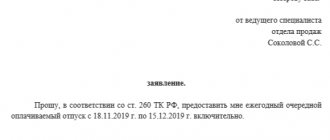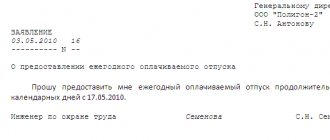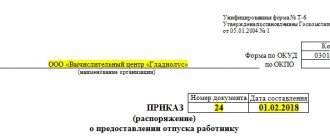The following two tabs change content below.
- Author
- Author's articles
Anastasia Klimenkova (Lawyer)
7 years of experience.
Author: Anastasia Klimenkova (Lawyer) (All articles by the author)
- Change and termination of a lease agreement due to the 2020 pandemic: judicial practice - 02/04/2021
- Can they be forced to get vaccinated against coronavirus - 02/01/2021
- Right to privacy - 01/28/2021
In the modern world, many are employed in two places at the same time. If at all enterprises an employee has concluded an employment contract, he is officially considered a part-time worker. Since Article 122 of the Russian Labor Code states that every employee has the right to long rest, many are interested in how leave is provided for part-time work and the main place of work.
Provision rules for external part-time worker
The right of a part-time worker to rest is guaranteed by Article 286 of the Labor Code of the Russian Federation. According to this article:
- part-time workers are entitled to paid vacation time annually;
- Leave for part-time work and the main place of work must be granted simultaneously.
The right to annual paid leave arises for an employee after 6 months of continuous work with a given employer. Before this period, it can only be provided by agreement between the employee and his employer (Article 122 of the Labor Code of the Russian Federation).
However, there is an exception to this rule for part-time workers. Even if the employee has not worked part-time for 6 months, leave for part-time work is granted to him in advance if two conditions are met:
- the employee asks for it; And
- during the same period, the employee takes leave from his main job (Article 286 of the Labor Code of the Russian Federation).
Results
Registration of imposing additional workload on a company employee can be expressed in 2 forms: internal part-time work and combination of positions. If an employee intends to perform labor functions in a position that requires distraction from his main job, then such labor relations must be formalized in the form of a separate employment contract on internal part-time work.
https://www.youtube.com/watch{q}v=yJfrcbk7EpI
At the same time, it is important for the company not to forget to receive a corresponding application from the employee, as well as issue an order to hire an internal part-time worker. If the additional position does not involve distraction from the main job, then the specialist can combine them, that is, work at the same time in several positions in the company.
Is it necessary to take into account the order?
Typically, vacations are provided in accordance with the schedule approved by the organization in the order of priority.
However, in the case of part-time workers, the rule on priority established by Art. 123 of the Labor Code of the Russian Federation, does not work. Part 1 art. 286 of the Labor Code of the Russian Federation allows a part-time employee to rest at a time convenient for him in order to combine it with rest at his main place of work.
Expert opinion
Labor Lawyer Olga Smirnova
The basis for exercising the right to an extraordinary grant of leave to a part-time worker will be a certificate or an extract from the leave schedule at the main place of work, confirming that the employee intends to rest on the same dates.
If part-time work becomes the “main”
It happens that an employee decides to quit his main job and make part-time work his main job. If the employer does not mind, then it is enough to conclude an agreement to change the terms of the employment contract (Article 282 of the Labor Code of the Russian Federation).
But such a change in the employee’s work activity usually affects the first vacation following it. The employee's vacation period will not be affected. It will partially include a period of part-time work and a new main place of work. But since “part-time” work usually brings in less income than the main one, and when calculating average earnings this lower income will also be taken into account, the employee will most likely receive less vacation pay.
The list contains the names of professions and positions of workers in production and workshops who perform work directly indicated in the List. Question: Can an employee combine work in two positions provided for in the organization’s staffing table at his main place of work? (Expert consultation, 2010) Answer: Hiring is formalized by an order (instruction) of the employer, issued on the basis of a concluded employment contract (Article 68 of the Labor Code of the Russian Federation). The concept of an employment contract is given in Art. 56 Labor Code of the Russian Federation. An employment contract is an agreement between an employer and an employee, according to which the employer undertakes to provide the employee with work for a specified job function. At the same time, labor legislation does not provide for the possibility of specifying several labor functions in one employment contract.
Simultaneous provision - a right or an obligation?
In accordance with the provisions of the Labor Code of the Russian Federation mentioned above, an employee has the right to register time off simultaneously at both places of employment. However, the law does not oblige the employee to use this opportunity. The following rules apply:
- if an employee has taken leave at his main job, he can take it at a part-time job or not use this opportunity (in this case, leave from his main job and part-time leave will be granted at different times). Then the employee does not have the right to take advantage of preferential conditions at the place of part-time employment;
- If an employee has taken leave while working part-time, he is obliged to take it at his main place of work.
Expert opinion
Labor Lawyer Olga Smirnova
This position is supported by judicial practice. Thus, according to the Appeal ruling of the Novosibirsk Regional Court dated September 1, 2015 in case No. 33-7502/2015, the preferential conditions for granting vacations in Article 286 of the Labor Code of the Russian Federation are aimed at exercising the right to rest by a part-time employee. This rule provides for the emergence of an obligation to take leave at both places of employment only if the employee exercises the right to rest at his/her place of employment. The opposite norm is not established by law. Therefore, leave from the main place of work does not require simultaneous departure on part-time leave.
Completion of combining positions
As mentioned above, if a company organizes a combination of positions, then the period during which such combination will be valid is determined in advance. Therefore, the question arises: what will happen after this period {q}
We suggest you read: Currently on maternity leave
The combination ceases to be valid, i.e. the employee is further obliged to perform only his main duties. At the same time, the legislator does not provide for the need to draw up any special document closing the combination.
Therefore, everything here remains at the discretion of the company: you can issue a special order that terminates the employee’s combined powers, or you don’t have to do this - the combination will still be considered completed (unless the company has issued another order extending the employee’s combined powers).
In addition, the Labor Code of the Russian Federation establishes that at any time, both one and the other party can stop combining unilaterally (Article 60.2 of the Labor Code of the Russian Federation). To do this, you simply need to send the appropriate notice (if the initiator of the cancellation is a company) or a statement (if the initiator is an employee) to the other party no later than 3 business days in advance.
ATTENTION! If the initiator of the termination of the combination is the company, then it makes sense for it to acquaint the employee with the relevant notice against a receipt, so that later it does not turn out that he, since he knew nothing about the cancellation, continued to work for some time, combining 2 positions, for which he demands appropriate remuneration.
Internal part-time leave
If you work part-time in the same organization, the rules for granting leave do not change. An employee has the right to take both vacations at the same time, and if there are not enough days on a part-time basis, receive them without pay.
It should also be taken into account that in the case of internal part-time work, the same employer already has all the necessary documents confirming the planned dates of rest. Therefore, the employee is not required to additionally provide an extract from the vacation schedule at the main place of employment as a basis for exercising his right to simultaneous rest during the same period.
Vacation in advance
More controversial situations also occur. For example, an employee has been working at his main place of work for more than six months, which means he has the right to annual leave. As a part-time worker, he has been working for less than 6 months. What should the employer do - refuse or provide time for rest? Is the part-time worker entitled to vacation pay in this case?
Refusal to grant leave would be unlawful. The employer is obliged to send the employee on vacation “in advance”. But you cannot demand to work until you reach six months.
Changing the vacation schedule
Due to the extraordinary procedure for providing vacation to part-time workers, it is not necessary to include information about them in the vacation schedule.
Based on the certificate provided by the employee or an extract from the vacation schedule from the main place of work, such changes can be made at the request of the employer. But there is no rule obliging this to be done in the law. There is no practical point in making such changes: regardless of the content of the vacation schedule, the employer of a part-time worker will have to provide him with vacation simultaneously with his main job.
Each of the part-time employees' vacations when working on an internal part-time basis is formalized by its own order on its provision.
The concept of combining positions (professions)
Combination work as one of the types of additional work assigned to an employee is regulated by Art. 60.2 Labor Code of the Russian Federation.
This is the performance by an employee, in parallel with the main work, of additional work in another profession (position), as well as the performance of the duties of a temporarily absent employee for additional pay (Article 151 of the Labor Code of the Russian Federation). It is carried out without exemption from the main work within the normal working hours.
The concept of “combining professions” refers to blue-collar professions, and “combining positions” refers to employees and specialists.
We invite you to read: Registration of foreign citizens at the place of stay
For combination you need:
- mandatory written consent of the employee to this;
- an additional agreement to the employment contract, stipulating the duration, content, volume and payment of additional work;
- issuance of an order from the employer regarding this.
Combining positions (professions) should be distinguished from internal part-time work, in which an employee works under an independent employment contract outside of working hours under the main employment contract.
These are completely different labor regimes, the mixing of which leads to errors in timesheets, calculations of workers’ wages, their average earnings, vacation pay, temporary disability payments, etc.
Other types of holidays
In addition to the annual paid one, a part-time worker has the right to other types of leaves guaranteed by labor legislation. This follows from Art. 287 Labor Code of the Russian Federation.
Maternity leave
For natural reasons, maternity leave is issued at all jobs at once. A sick leave certificate confirming your stay on maternity leave must be issued in several copies, one for each employer.
The place of maternity payments depends on which employer paid insurance premiums for the employee and for what period. If both the main employer and part-time employer have paid insurance premiums for the last two years, you can receive payments in two places.
Training
According to Part 1 of Art. 287 of the Labor Code of the Russian Federation, study leave is granted to an employee only at his main place of work. At the place of part-time employment, this issue will have to be resolved by agreement with the employer. To release an employee (including at his own expense) in this situation is the right, but not the obligation of the employer.
Additional
Additional leave for work in the Far North and equivalent areas (Article 321 of the Labor Code of the Russian Federation) is not provided to part-time workers. This follows from Part 1 of Art. 287 Labor Code of the Russian Federation.
Additional rest time for other reasons is provided to part-time workers in the general manner, as at the main place of work.
We hope you found this article useful. The article contains information about general rules of law and does not replace legal advice. Contact an attorney for an answer to your specific question.
How to arrange leave for a part-time worker?
Maternity leave, educational leave, main leave – let’s look at the types of leave
Any employee has the right to enter into employment contracts to perform other regular paid work in his free time from his main job.
This may be an employment contract with the same employer (internal part-time job) and/or with another employer (external part-time job). Both external and internal part-time workers have the right to regular annual paid, extended annual paid, additional and maternity leave. The main annual leave is due both at the main job and at a part-time job (Article 286 of the Labor Code of the Russian Federation), and at the same time.
If a part-time employee holds a position or performs work for which extended annual paid leave and/or additional paid leave is provided, then the employer is obliged to provide him with such leave. In this matter, no exceptions are made for part-time workers.
For example, the following are entitled to extended basic paid leave:
— teaching staff (Article 334 of the Labor Code of the Russian Federation, Decree of the Government of the Russian Federation of May 14, 2015 No. 466);
- medical workers who diagnose and treat HIV-infected people (clause 4 of the Decree of the Government of the Russian Federation of April 3, 1996 No. 391).
Additional paid leave is provided, for example, if an employee:
— engaged in work with harmful and (or) dangerous working conditions;
- has a special nature of work.
In local regulations, an organization can reflect the right of employees to additional leave for length of service or as an incentive.
Maternity leave can be taken part-time, but to do this, the employee must also take leave from her main job, and also provide the original sick leave certificate to each employer. Maternity payments are accrued by all organizations where she is employed, but only if the employee has worked in these places for at least two years. Please note: the employee will receive state child care benefits only for one place of work. She can choose independently (Article 13, paragraph 2. 255-FZ).
Like regular leave, this type of release from work lasts the same at all places of employment and does not depend on the type of part-time job at additional work.
But you have every right not to let your partner go on study leave. According to the Labor Code, such leave is granted only at the main place of work (Article 287 of the Labor Code of the Russian Federation). Practice shows that employees most often agree with the employer to provide leave without pay for the period of study or passing exams.
Any type of part-time leave is issued in the usual manner established by Ch. 19 Labor Code of the Russian Federation. For internal part-time workers, these procedures are performed twice - for each position.
For internal part-time workers in the Kontur-Personnel program, you can issue one order for both positions.
Try for free
Annual paid: release cannot be refused
Both at the main place of work and at a part-time job, annual paid leave is provided simultaneously. In the case of internal part-time work, as a rule, no difficulties arise: vacation is planned in one calendar period, vacation pay is calculated for both positions held.
The situation with an external part-time worker is somewhat different: at the main job, his vacation is approved by the head of the enterprise through the vacation schedule and paid based on his salary. The employer in the second place does not have the right to refuse a part-time worker, nor can he demand documentary evidence from the main job.
In a situation where a part-time worker has not yet worked the six months required by the Labor Code, but is going on vacation at his main job, the employer is forced to provide him with vacation in advance.
We remind you that annual paid leave for part-time work, as well as for the main place of work, cannot be less than 28 days. The calculation of the duration of vacation includes weekends, but does not include official public holidays and days of illness confirmed by a certificate of incapacity for work (Article 124 of the Labor Code of the Russian Federation).
Vacation pay for a part-time employee is accrued according to the general rule, based on average earnings, taking into account all bonuses, allowances, and coefficients. For internal part-time workers, make two calculations: for the main position and for the additional one - as if two different people were going on vacation.
If holidays do not match
We are talking about cases where the duration of vacation at two places of work differs. This often happens if a person occupies different specific positions, for example, at his main place of work he is a teacher and has the right to extended leave, and at the second place he is a sales department manager. Confirmation of the extended nature of the vacation must be a certificate or an extract from the vacation schedule certified by the employer at the main place of work.
An employee, at his own discretion, can write an application for leave without pay (Article 286 of the Labor Code of the Russian Federation) both for the entire different period of time, and for a smaller number of days. The employer is not required to pay for this period.
However, the opposite situation is also possible, when the vacation at the main job is shorter - in this case it is not extended.
Do I need to pay compensation?
If at the time of dismissal a part-time employee has unused vacation time, then he has the right to monetary compensation for unused vacation time (Article 127 of the Labor Code of the Russian Federation). The only condition is that the employee must work for the organization for at least two weeks.
The amount of compensation is calculated according to the general rule; the calculation is based on the average salary. The amount of compensation, as well as the fact of its payment, do not depend on the reasons for which the employment relationship is terminated.
If a part-time worker quits before the end of the working year for which he received leave, then the amount received in advance is deducted from his salary when calculating (Article 137 of the Labor Code of the Russian Federation).
If an employee refuses vacation for some reason, remind him that not using vacation for several years is a violation of the law. For the employer, this entails administrative liability. An employee’s refusal to take regular leave can be considered a violation of labor discipline, which entails disciplinary action.
Who is entitled to vacation days and when?
Part-time workers, like main employees, are entitled to all types of leave: annual, additional, maternity leave. Days off are provided, as a rule, simultaneously with rest at the main place of work.
The following regulations are established for vacation periods:
- annual regular - always coincides in time with vacation in the main position. The right for the manager to act when arranging a vacation for an employee’s combined work is a certificate from the head enterprise. A part-time worker may not work the standard six months;
- additional - provided only to certain categories of workers. For work in the Far North, in conditions of irregular employment hours, in hazardous circumstances, for long work experience, additional days of rest are added to the annual leave in full and without reductions;
- maternity or pregnancy . In order for a part-time worker to receive it, she must first prepare documents for the parent company, and then submit an application and a duplicate sick leave certificate to the additional employer. Maternity leave is paid in both companies if the part-time employee has ≥2 years of experience. Child care benefits are issued only for one job: at the mother's choice;
- educational - provided when a certificate is received from a university or college to pass the examination session when receiving a first education. Vacation is given and paid only at the main enterprise - this is stated in Art. 287 TK. At a part-time job, the employer may refuse to provide days off or let you go, but at the expense of the part-time worker.
Going on vacation without maintaining earnings does not differ from the generally established procedure. In all cases, you must write a leave application for each job performed.
The employer of a part-time worker may request a certificate from the parent company confirming the fact of rest during the requested period. It is not necessary to respond to such an appeal: according to the Labor Code, such a provision is not provided.
Vacation pay
The procedure for granting vacations to part-time workers is clear, but what about calculating the vacation pay due? There are no special rules here. The average salary level for a specific position is taken into account. The procedure is no different from the generally accepted one. Persons working part-time are compensated for annual paid leave in full.
If we are talking about payments to an internal part-time worker, then the amounts of vacation pay are calculated for each position separately. They are also separated from each other on receipts.









